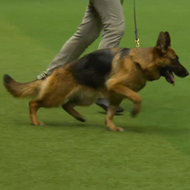
German shepherd's sloping back prompts concern
Crufts has come under criticism after a judge awarded 'best of breed' to a German shepherd dog with a sloped back that appeared to have difficulty walking.
Speaking on the final day of Crufts, show commentator Jessica Holm described the concerns with the dog: "The front end of the dog and the back end of the dog are doing completely different things.
"The way the back is sloping, the weakness in the rear and the fact that the dog's hind legs are right underneath it are all points that the breed standard very clearly says should be considered as faults."
Veterinary surgeon Nick Blayney, who is chair of the Kennel Club's Dog Health Group, added: "I was quite frankly appalled that a dog like that could be put up as a good specimen of the breed."
Dr Blayney and Kennel Club secretary Caroline Kisko said the situation is "disheartening" after the hard work that has been put in to preventing such events over the past few years.
Actions taken to address these types of issues in recent years include the Breed Watch and 'Category Three' breeds. The Kennel Club says these have resulted in vast health improvements for many breeds, but Dr Blayney felt the Breed Watch had been "largely disregarded" in this case.
"Everything that's wrong with that dog is recognised in Breed Watch as something we should be steering against," he added.
During the interview with Crufts presenter Clare Balding, Ms Kisko acknowledged that the Kennel Club would need to review the support given to breeds. "But, significantly, we need to sort out certain breeders who are disregarding what we're asking them to do," she added.
Responding to the controversy, the RSPCA's chief scientific officer Julia Wrathall offered to meet with the Kennel Club to discuss how they could work together to resolve these issues. Dr Wrathall also called for better training and accreditation of judges to ensure health, welfare and behaviour are a top priority.
Footage of the dog has prompted a fierce outcry on social media and her owner has described the response as "the worst nightmare of my show life" as she has been "tried and convicted" by social media and the press.
Image (c) Crufts/Channel 4



 The Veterinary Medicines Directorate (VMD) is inviting applications from veterinary students to attend a one-week extramural studies (EMS) placement in July 2026.
The Veterinary Medicines Directorate (VMD) is inviting applications from veterinary students to attend a one-week extramural studies (EMS) placement in July 2026.